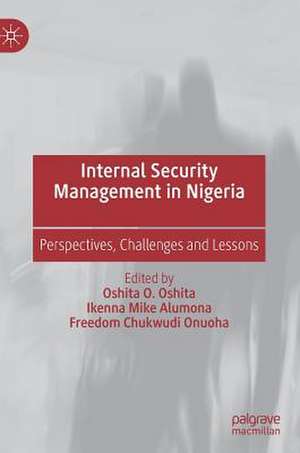Internal Security Management in Nigeria: Perspectives, Challenges and Lessons
Editat de Oshita O. Oshita, Ikenna Mike Alumona, Freedom Chukwudi Onuohaen Limba Engleză Hardback – 7 aug 2019
Preț: 1127.60 lei
Preț vechi: 1375.12 lei
-18% Nou
Puncte Express: 1691
Preț estimativ în valută:
215.79€ • 223.92$ • 180.36£
215.79€ • 223.92$ • 180.36£
Carte tipărită la comandă
Livrare economică 15-29 martie
Preluare comenzi: 021 569.72.76
Specificații
ISBN-13: 9789811382147
ISBN-10: 981138214X
Pagini: 679
Ilustrații: XXVIII, 673 p. 6 illus.
Dimensiuni: 148 x 210 mm
Greutate: 0.98 kg
Ediția:1st ed. 2019
Editura: Springer Nature Singapore
Colecția Palgrave Macmillan
Locul publicării:Singapore, Singapore
ISBN-10: 981138214X
Pagini: 679
Ilustrații: XXVIII, 673 p. 6 illus.
Dimensiuni: 148 x 210 mm
Greutate: 0.98 kg
Ediția:1st ed. 2019
Editura: Springer Nature Singapore
Colecția Palgrave Macmillan
Locul publicării:Singapore, Singapore
Cuprins
Introduction: Understanding the Crisis of Internal Security Management in Nigeria.- Section One: Theoretical Perspectives.- Chapter 1 Theoretical issues in Internal Security Management in Nigeria: An Overview.- Chapter 2 The State and Internal Security Management in Nigeria: A Theoretical Perspective.- Chapter 3 A Historical Perspective of Nigeria’s Internal Security since 1999.- Section Two: Threats to Internal Security in Nigeria.- Chapter 4 The Phenomenon of Boko Haram in Northern Nigeria.- Chapter 5 Herdsmen Violence in Nigeria.- Chapter 6 Re-examining Communal Conflicts in Central Nigeria: A Political Ecology Perspective.- Chapter 7 Youth Militancy in the Niger Delta Region.- Chapter 8 Unemployment, Migration and Cyber Criminality in Nigeria.- Chapter 9 The Challenges of Environmental Insecurity in Nigeria.- Chapter 10 Crimes and Internal Security in Nigeria.- Chapter 11 The Evolving Threat of Kidnapping for Ransom in Nigeria.- Chapter 12 The Emerging Culture of (Un)armed Violence by Legal/Illegal Revenue Collectors in Urban Cities in Nigeria: Evidence from Enugu State.- Chapter 13 Porous Borders and Human Trafficking in Nigeria.- Chapter 14 Arms Proliferation, Boko Haram Extremism and Insecurity in Nigeria.- Chapter 15 Police Corruption and Internal Security in Nigeria.- Chapter 16 Dimensions and Manifestations of Spiritual Threats and Insecurity in Contemporary Nigeria.- Section Three: Formal and Informal Agencies and the Management of Internal Security in Nigeria.- Chapter 17 The Nigerian Army and Internal Security Operations in the Fourth Republic.- Chapter 18 Military Joint Task Force and the Challenges of Internal Security Operations in Nigeria: The Plateau State Experience.- Chapter 19 The Nigerian Police and Internal Security Management in Nigeria.- Chapter 20 The Nigerian Security and Civil Defence Corps and Internal Security Management in Nigeria.- Chapter 21 The Nigerian Immigration Service and Internal Security Management in Nigeria.- Chapter 22 Nigerian Prisons Service and Internal Security Management in Nigeria.- Chapter 23 Non-State Actors and Internal Security Management in Nigeria: The Case of Private Security Companies.- Chapter 24 Non State Actors and Internal Security Management in Nigeria: The Case of Vigilante Groups.- Section Four: Challenges of Internal Security Management in Nigeria.- Chapter 25 The Nigerian Project and the Quest for Sustainable National Security.- Chapter 26 The Political Economy of Security Votes and internal security management in Nigeria.- Chapter 27 Nigeria’s Changing Security Matrix and Management of Insecurity.- Chapter 28 Security Funding, Accountability and Internal Security Management in Nigeria.- Chapter 29 Social (in)security and Internal Security Management in Nigeria.- Chapter 30 Gender and Nigeria’s Internal Security Management.- Chapter 31 Youth and Nigeria’s Internal Security Management.- Chapter 32 The African – European Union Partnership on Peace and Security and Internal Security Management in Nigeria.- Chapter 33 Internal Security Threats and Economic Prosperity in Nigeria: Implications and Policy Options.- Chapter 34 The Political Economy of Security Votes and internal security management.- Chapter 35 Conclusion: Rethinking Nigeria’s Internal Security Architecture.
Notă biografică
Oshita Osang Oshita is a Professor of Peace and Development Studies and former Director General and Chief Executive Officer of the Institute for Peace and Conflict Resolution (IPCR), Ministry of Foreign Affairs, Abuja, Nigeria.
Ikenna Mike Alumona is an Associate Professor of Political Science and Acting Head of Department at Chukwuemeka Odumegwu Ojukwu University, Igbariam, Anambra State, Nigeria.
Freedom Chukwudi Onuoha is a Senior Lecturer at the Department of Political Science, University of Nigeria, Nsukka, and the Coordinator of the Security, Violence and Conflict (SVC) Research Group at the University.
Ikenna Mike Alumona is an Associate Professor of Political Science and Acting Head of Department at Chukwuemeka Odumegwu Ojukwu University, Igbariam, Anambra State, Nigeria.
Freedom Chukwudi Onuoha is a Senior Lecturer at the Department of Political Science, University of Nigeria, Nsukka, and the Coordinator of the Security, Violence and Conflict (SVC) Research Group at the University.
Caracteristici
Provides a detailed and critical analysis of the contemporary internal security challenges facing the Nigeria state
Offers theoretical explanations that are necessary for appreciating the dynamics of the manifestation of insecurity in Nigeria
Provides comprehensive analysis for understanding the issue of internal security in Nigeria
Offers theoretical explanations that are necessary for appreciating the dynamics of the manifestation of insecurity in Nigeria
Provides comprehensive analysis for understanding the issue of internal security in Nigeria
